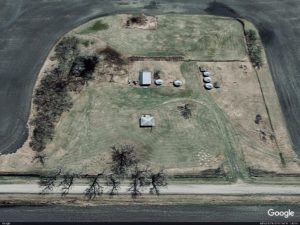(Is that proper English?)
I have a distinct memory of me walking around our property (somewhere between the square building in the photo and the larger rectangular building), acutely aware that God loved me unconditionally, and that He was the only one who could love me like that. I knew, without a shadow of a doubt, that no matter what, God would always love me, even if I did something so bad that my friends and even my parents couldn’t. And that was a stretch, as I came from a very loving home.
This does not mean that I believed that I would be rich or that nothing bad would ever happen to me. I wasn’t stupid. And when bad things did happen, I would wonder why and even get angry, but I knew that God loved me, no matter what.
Fear God?
When I hear other people talk of their issues being raised in church, I realize that mine is not a typical story. I have never, ever been afraid of God. Never. I have never had a fear of hell, or of not measuring up to God’s standards. I’ve often been afraid of not measuring up to man’s standards, or even my own, but I’ve always known that I’m OK with God. I’ve never, ever doubted that. He has always been my failsafe.
As you’d expect, many people throughout my life have tried to “put the fear of God in me.” I’ve heard my share of holy roller, hellfire, end-times, holiness and guilt preachers. I was not raised in that kind of environment, but I have been surrounded by evangelicals and fundamentalists since my teens. First it was “The Late Great Planet Earth” then came the Jesus Movement. Growing up Christian in the 60’s And 70’s was a weird time. I had my share of fear and trembling, but it was never the fear of God. I knew that God loved me, and would accept me no matter what.
Why me?
I am aware–perhaps now than ever–that my seemingly innate knowledge of God is not typical, and like Kris Kristofferson, I don’t know “why me?”
I’m not complaining, and definitely not boasting the way some do when they talk about how “blessed” they are. Perhaps I just needed that innate sense of God to survive. What I know is, I didn’t “accept” Jesus or decide to believe in God. I just always did. It was God who accepted me. And as Jesus is quoted as saying in John 10, no one is going to snatch me out of God’s hand. I’m apparently here to stay, because it’s not up to me to persevere (sorry, Calvin). And, of course, I’m not complaining at all.
So here I am, nearly 64 years old, and my faith in God is essentially the same as when I was 4. Certainly I know more theology (for better or for worse), but what theology has done is to allow me to threw away all of the trash that popular Christianity has tried to dump on me–I have walked through the maze of pop religion (my initial draft said “bullshit” but I toned it down), and found I was still standing in my front yard knowing that God loves me, no matter what.
This I know too
But I know something else: God loves all of you, too, even if you don’t believe it’s possible. He loves you “just the way you are” (was that Billy Joel, or Mr. Rogers?). God loves you even if you can’t love yourself. You may be filled with guilt and shame, just wanting to keep hidden from view. But, I know that God’s love isn’t affected by your feelings, or your actions. Love is God’s essence; it’s impossible for him not to love.
God has never said, “Love me or go to hell.” It’s just bad preachers who say that. There’s no one dangling over the pit of hell. The Bible doesn’t teach that “God is wrath.” It teaches that God is love.
Many Christians will be very upset that I say such things, as they’ve been motivated their whole lives by a fear of hell and judgments and they think it’s somehow dangerous to believe that God is not one part love and one part wrath. Or, they think it’s at least unfortunate that those people we don’t love won’t be torched by God in the afterlife.
The thing is…
The think about believing in a loving God is that it means that God actually does love Muslims, and LGBTQ+ people, and all of those refugee people. And, he loves them just as much as he loves us.
Whoa.
So, I guess we’ll need to talk some more about this.


